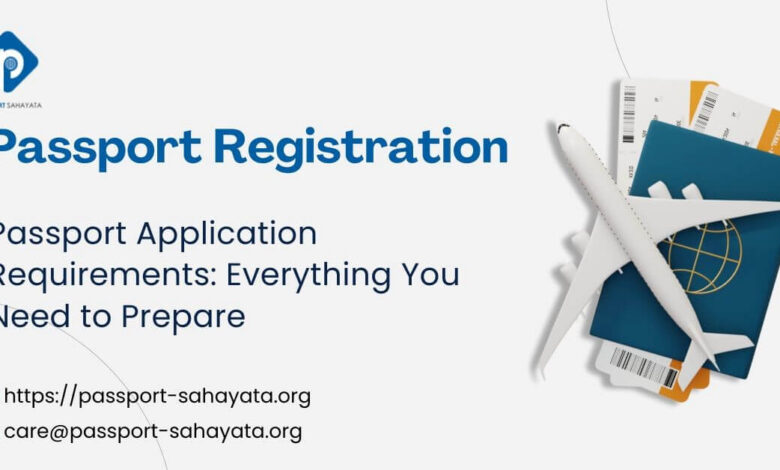Passport Application Requirements: Everything You Need to Prepare

What is a Passport
A passport is an official travel document issued by a government that certifies the identity and nationality of its holder primarily for international travel. It contains information about the passport holder such as their full name, photograph, date of birth, nationality, and other identifying details. Passports are typically small booklets that include multiple pages for visa stamps and entry/exit stamps from various countries.
Apply for passportcan seem daunting, but with the right preparation, the process can be straightforward and stress-free. This guide covers everything you need to know about passport application requirements, ensuring you have all the necessary documents and information ready.
Key Components of a Passport
Personal Information Page:
This page includes a photograph of the holder, full name, date of birth, place of birth, nationality, gender, passport number, date of issue, and date of expiration.
Visa Pages:
Blank pages within the passport where visas, entry, and exit stamps are placed.
Signature:
The passport holder’s signature is often required to validate the document.
Security Features:
Modern passports include various security features such as watermarks, holograms, micro printing, and RFID chips to prevent forgery and unauthorized alterations.
Types of Passports
Ordinary Passport
This is the most common type of passport issued to citizens for regular travel, such as tourism, business trips, and personal travel.
Diplomatic Passport
Issued to government diplomats and consular officers for official international business, diplomatic passports often grant certain privileges and immunities.
Official/Service Passport
Issued to individuals traveling on behalf of the government for official purposes, but who do not qualify for a diplomatic passport.
Emergency Passport
A temporary passport issued to individuals who need to travel urgently and do not have time to wait for a standard passport.
Family Passport
Some countries issue family passports that include the names and photographs of immediate family members, allowing them to travel together under a single document.
Importance of a Passport
Proof of Identity and Citizenship
A passport serves as a primary proof of identity and citizenship for international travel. It is a universally recognized document that confirms the holder’s legal identity and nationality.
International Travel
Passports are essential for international travel. They are required to enter and exit foreign countries, and to return to the passport holder’s home country. Without a passport, international travel is not possible.
Visa Applications
Many countries require travelers to obtain visas for entry. A valid passport is necessary to apply for these visas. Visa stamps and stickers are placed in the passport to indicate permission to enter, stay, and exit the country.
Security and Legal Protection
Passports include security features to protect against identity theft and forgery. In case of an emergency or legal issues abroad, a passport allows the holder to seek assistance from their home country’s embassy or consulate.
Proof of Legal Status
A passport can serve as proof of legal status in a foreign country. For example, it can be used to show lawful entry and the duration of stay permitted by immigration authorities.
Access to Consular Services
Possession of a passport entitles the holder to consular services while abroad. This includes assistance in emergencies, such as natural disasters, political unrest, or legal issues. Consulates can provide help with lost passports, medical emergencies, and other critical situations.
Facilitates Economic Opportunities
Having a passport can open up economic opportunities, such as international business travel, study abroad programs, and employment in foreign countries. It is a key document for participating in the global economy.
Travel Freedom
A passport enhances travel freedom, allowing holders to visit numerous countries. Some passports offer visa-free or visa-on-arrival access to many destinations, making travel more convenient and less restrictive.
Renewal
Passports must be renewed periodically, typically every 5-10 years depending on the country and the age of the passport holder. The renewal process usually requires submitting an application form, the current passport, updated photographs, and applicable fees.
Special Considerations
Children:
Minors often require additional documentation and parental consent to obtain a passport.
Name Changes:
Individuals who have legally changed their name must provide legal documentation of the change.
Lost/Stolen Passports:
If a passport is lost or stolen, it must be reported to the issuing authority immediately. A replacement passport can be issued, often requiring additional fees and documentation.
Proof of Citizenship
Birth Certificate
A certified birth certificate is the most common proof of citizenship for U.S. citizens born in the United States. This document must be issued by the city, county, or state of birth, and it should include your full name, date, and place of birth, parent’s names, date filed with the registrar’s office, and a registrar’s signature.
Naturalization Certificate
If you became a U.S. citizen through naturalization, you must provide your original Naturalization Certificate or a certified copy.
Certificate of Citizenship
Individuals who acquired or derived U.S. citizenship through their parents should submit their Certificate of Citizenship. This applies if you were born abroad to U.S. citizen parents or became a citizen through the naturalization of your parents.
Identification Documents
Applicants must present a primary identification document, such as a valid driver’s license, a government-issued ID, or a military ID. This document must include your photo, signature, and identifying information.
Travel Plans
While not always required, having details of your travel plans, such as flight bookings or travel itinerary, can sometimes expedite the processing of your application.
Keep Copies
Make copies of all documents you submit, including your application form and identification documents. This ensures you have records in case anything is lost during processing.
Naturalization Certificate
If you become a U.S. citizen through naturalization, you must provide your original Naturalization Certificate or a certified copy. This document serves as legal proof of citizenship and includes essential details such as your full name, date of birth, and certificate number.
Certificate of Citizenship
Individuals who acquired or derived U.S. citizenship through their parents should submit their Certificate of Citizenship. This applies if you were born abroad to U.S. citizen parents or became a citizen through the naturalization of your parents. This certificate must be the original or a certified copy, containing vital information including your name, date, and place of birth.
Consular Report of Birth Abroad
For U.S. citizens born abroad, the Consular Report of Birth Abroad (CRBA), issued by a U.S. embassy or consulate, serves as proof of citizenship. This document verifies your birth outside the United States to U.S. citizen parents and is essential for passport application.
Suggested – Reissue of Passport
Conclusion
Preparing for a passport application involves gathering several important documents and understanding the specific requirements of your situation. By ensuring you have proof of citizenship, proper identification, passport photos, completed application forms, and the necessary fees, you can streamline the process and avoid common pitfalls. Whether applying for the first time or renewing an existing passport, this guide provides all the information needed to ensure a successful application.






